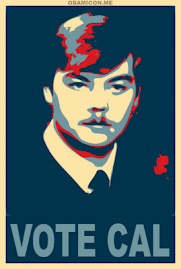I think they really don't mean what they think they mean with this poster.

"A significant majority of Canadians are willing to risk friction with other nations in pursuit of this country's interests, according to a new survey that suggests Canada has "grown feistier" about its role in the world during this decade. The poll of 1,600 Canadians, commissioned by the Montreal-based Association for Canadian Studies, found 67 per cent of respondents agreed with the statement: "Canada should follow its own interests even if it leads to conflict with other nations. "This contrasts with 49 per cent in 2003 who agreed with this view," notes the study of Canadian attitudes towards the country's place on the global stage, prepared by ACS executive director Jack Jedwab. The findings indicate Canadians have "grown feistier when it comes to defending their interests on the international front," the study states. The survey also showed 58 per cent of respondents believe Canada has gained more sway in international affairs in recent years. "In this decade, Canadians refused the invitation of the U.S. to send troops to Iraq," the study notes. "More recently they have warned Russia not to push their claims on Arctic sovereignty. The majority of Canadians think that their influence in world affairs has grown over the past few years." At the same time, nearly half of those surveyed — 47 per cent — expressed concern that international organizations "take too much power from Canada" on the world stage. According to a 2003 survey cited in the ACS study, only 27 per cent of Canadians felt that way six years ago. The latest survey, conducted in March by Leger Marketing, has a margin of error of 3.9 percentage points, 19 times out of 20. Jedwab says evidence that Canadians believe the country's "prestige has grown" is emerging just as Canada approaches an optimistic new era in its relationship with the U.S. under President Barack Obama, who is due to announce a new ambassador to Ottawa. "This could be a very long honeymoon period," Jedwab said in an interview. "A lot of what Obama says rings very nicely with Canadian views on a whole set of issues." But pointing to a recent Gallup poll in the U.S., Jedwab notes that while Canada is widely seen as that country's best friend, it actually trails Britain as the U.S.'s "most valuable ally" in the minds of many Americans. The late February poll of 1,023 U.S. residents found 36 per cent of respondents named Britain as best ally, compared with 29 per cent for Canada. Japan (12 per cent), Israel (10 per cent) and Germany (five per cent) garnered a significant number of responses, as well. The Gallup poll also illuminated differences of opinions between Republicans and Democrats in terms of which country is the U.S.'s best ally. While 35 per cent of Democrats ranked Canada ahead of Britain (32 per cent), Republicans strongly preferred Britain (41 per cent) over Canada (26 per cent). And while Britain was named top ally in the eastern, western and southern regions of the U.S., 39 per cent of respondents in the Midwest chose Canada over Britain (31 per cent). "Going forward, we're in a feel-good mood with the United States," said Jedwab. "We still feel pretty good about ourselves internationally. But that may change, depending on where Obama sees U.S. interests heading, and who he thinks its most valuable allies are."























































































%20(002).jpg)













.jpg)










No comments:
Post a Comment